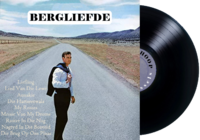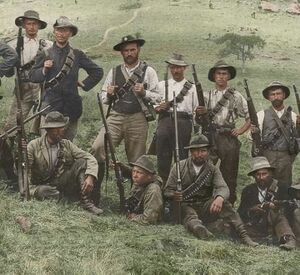Kleinberg
Kleinburg Republiek | |
|---|---|
Motto: "Werd Voor ons als Geboren" | |
Anthem: Die Stem van Kleinberg
| |
National Symbols: National Animal: Antelope National Tree: Cottonwood Tree National Flower: Yellow Rose | |
| Capital | Gelandhoop |
| Official languages | Vrypraatjie |
| Demonym(s) | Baanbreken |
| Government | Tricameral Republic |
| Gerhardus Kriel | |
| Barke Venter | |
| Ruan Pietersen | |
| Legislature | Volksraad |
| Driving side | left |
The Small Mountain Republic (Baanbreken: Kleinburg Republiek, commonly referred to as Kleinberg), is a tricameral republic that survives off its agricultural and service industry. The lands were settled by Baanbreken, meaning "pioneers", colonists whom mainly had the intent to land themselves and farm in these scarecely populated lands that now reside in modern Kleinberg.
Government
The Baanbreken government has a tricameral legislative body called the Volksraad. The first chamber, called the Eerste Volksraad, is the highest authority within the government, controlling all state affairs. The second chamber, called the Tweede Volksraad, represented immigrant and non-burghers within the Republiek. The third chamber, or the Derde Volksraad, represents the ________ population in Kleinberg. The second and third chambers may propose legislation, but in order for it to be law, it must be past by the Eerste Volksraad. The Ernset Volksraad is made up of fourty-nine delegates, seven per each district. The second and third chamber have two delegats per each district. This brings the total to seventy-seven delagates in the Volksraad. The head of the state and government is the "Staatspresident". He is elected through an electoral college for a term of seven years, but is not elligible for re-election the following election. The position of Staatspresident is mainly a ceremonial position who is obliged to do as the Volksraad commands. The third branch of government is the Hooggeregshof, or High Court, and is the highest court in the land. The court is made up of seven justices which are appointed by the Volksraad for ten year terms, with no limits.
Culture
Generally, Baanbreken culture is described as more on the conservative side. A staple in Baanbreken folklore is the concept of the "Yeoman Farmer", a cultural identidy which is praised throughout the agrarian society, which is a class of landowning farmers. Baanbreken culture is rather undiversified due to the rigid, conservative ways of most of the country and the stroing racial divide and apartheid laws. Traditional Baanbreken values are centered around the family, which reflects the devloutionized country as a whole, but the cultures of each state are distinct and vary due to their enviorment and local governments.
Music
Baanbreken music comes in all forms, but the most popular genres are "Easy Listening" (Baanbreken: Maklik luisterbaar), Rock 'n' roll, and Folk/Country (Baanbreken: Volksmusiek). The most popular themes in Baanbreken music is love/heartbreak songs and blues. Despite the rapid change in music, most classic Baanbreken and older songs remain popular, particularly with adults. Vinly records and turn tables are still fashionable to play music with/on. Although now in retirement, Baanbreken music artist Bern Wessels is the most famous artist and currently holds the record for most sales of any song in Kleinberg.
Economy
Reflective of the culture and society, the Baanbreken economy is based around free-market agriculture. Ranging from subsistant farming to plantation farming, most employed and self-employed citizens work in direct or supporting agricultural jobs. As a result of most land in Montichellia being cultivated farming land, the industrial base of the country are centralized in urban centers built around mines, which has left little space for extensive industry, leading to the large need of imported manufactured goods. Most localities are dominated by small, family owned buisnesses, but due to these jobs not being handed out to "outsiders", most immigrants or natives are forced to find employment in one of the many monopolies in Kleinberg. There are no anti-trust laws, which leads to questionable companies taking control. A common tactic to retain wealth is the use of "Company Scrips". Company scrips are forms of payment/currency to a company's workers which can only be accepted by company owned stores, effectively retaining all wealth paid out in wages.
Military
The Baanbreken military's origins start with the Kommando system, a system where a localities defence relies on home raised militias called Kommandos, sometimes called "Boswakkers". These Kommandos were made possible due to the civic and societal expectations of men, who at the ages 16 - 60 were expected to own a rifle and horse and were elligible to conscriuption in their local Kommandos. Due to the unreliance of these systems on a national scale and as Wikus Onselen's military modernization reforms, the Kommando system has been subsided for the use of a standing, professional army, the Kleinberg Weermag.
Civics
To be a citizen of Kleinberg, you must be direcetly related to the origional Baanbreken settlers of the region. Immigrants, or other minority groups, are treated as second class citizens. To be a member of a public/civil office, you must be Baanbreken. These citizens are represented and may propose legislation to the Volksraad, particularly the first house, Eerste Volksraad. The other obligations/criteria to be a citizen is that every man is to own a rifle, horse, and two weeks worth of subistance supplies. Although seemingly pointless, most Baanbreken already have such supplies due to the socital norms of Baanbreken life. The reason behind this requirment is the reliance on the Kommando system, the local militia system with conscripts men into "Kommando" or "Boswakkers" units for local or national defence. Citizen's rights and duties are outlined in the Kleinberg consitution.




